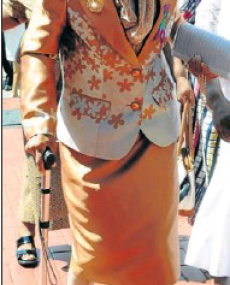
Selloane Ethel Leisa was born on 22* February 1914 in Ga-Marishane, Northern Transvaal, (now Limpopo Province). Upon completing her schooling, she moved to Johannesburg, Transvaal Province (now Gauteng) where she trained as a nurse. The city exposed her to racial and gender discrimination first-hand, which left her feeling shocked and eventually spurred her to take part in the liberation struggle. She joined the African National Congress (ANC) in the early 1940s and became a member of the African National Congress Women’s League (ANCWL).
Opting for an under-the-radar stance, she specifically took part only in local township meetings and avoided larger public gatherings. This was to ensure that she could continue to assist the struggle while going virtually unnoticed by the apartheid government.
She turned her home into a safe house, providing refuge for ANC political activists fleeing from the security police as the government clamped down on any resistance to apartheid and its policies. One of these activists was her cousin and ANCWL leader, Lilian Ngoyi, who during the Rivonia Treason Trial was on the run and needed a place to hide. Furthermore, she was one of many women who actively supported the ANC leaders who were on trial, raising money for their families and arranging emotional support as well as clothing and schooling for their children. Even when the ANC was banned in April 1960, Leisa refused to be intimidated and continued to help her comrades.
While working as a nurse at Shanty Clinic in Orlando West, Soweto, Gauteng, she joined the Federation of South African Women (FEDSAW), an organisation which aimed to unite women from all walks of life regardless of race or political affiliation. It was here that she worked closely with Ngoyi (who was a co-founder of the organisation) and played a role in the historic 1956 Women’s March to the Union Buildings in Pretoria, in opposition to the pass laws.
In the 1950s, she married her husband Nicodemus Leisa. However, because he was a Lesotho citizen, he was later deported by the government. They had three children together, two daughters and a son – Louis, Pauline and Mpho. When her son Louis got arrested after getting into a fight with a White man, Leisa approached Nelson Mandela and Oliver Tambo and asked them to represent him in court, which they did and won.
Besides being recognised for her defiance and bravery in the face of a repressive system, she is also acknowledged for giving back to her community. Her belief that education is a powerful tool that can be used to create change within society like it helped her to become a nurse, contributed to her becoming a founding member of the African Self-Help Association (ASHA), an organisation that has built a number of crèches around Soweto since its inception in the 1960s. She was also the chairperson of Khanyile Crèche in Mzimhlophe, Soweto, a position she held for 25 years. During this period, she raised funds and distributed second-hand clothes to the poor. She also ran an organisation called Palesa, which taught rural and urban women sewing skills to provide them with a way to make a living and support their families.
In 2014, she celebrated her 100th birthday at the Albertina Sisulu Centre in Mzimhlophe. In 2015, she was presented with the inaugural Unsung Heroes Award from the Desmond and Leah Tutu Legacy Foundation in recognition of all the selfless work she did throughout her life. Upon handing over the award, Leah Tutu described Leisa as an inspiration.
Selloane Ethel Leisa died on 6 July 2016 and was buried on 13 July 2016 at the Heroes Acre in Soweto. Through working as a nurse, providing shelter for political activists, and helping the poor, Leisa dedicated her life to serving others and for the betterment of all South Africans. She is survived by daughter Mpho, eight grandchildren and ten great-grandchildren.
*Or 27 February 1914